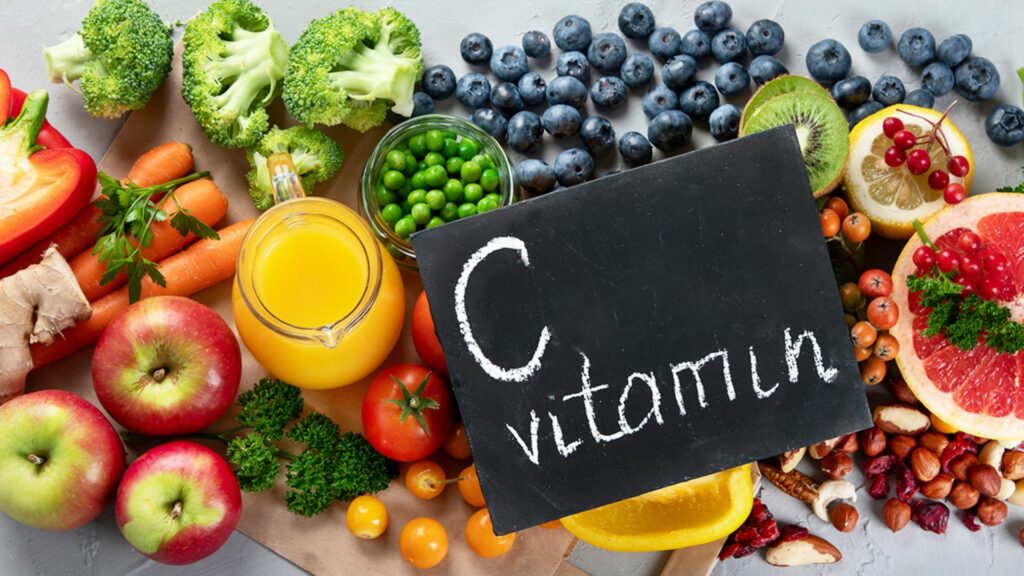Introduction to Vitamin C
Vitamin C, also known as ascorbic acid, is a water-soluble vitamin that plays a crucial role in maintaining health. It’s known for its antioxidant properties and is essential for collagen production, immune function, and wound healing.
Benefits of Vitamin C
Vitamin C offers a range of health benefits, including
- Immune Support: Enhances immune function and helps fight infections.
- Antioxidant Protection: Neutralizes free radicals, reducing oxidative stress.
- Skin Health: Supports collagen synthesis, promoting skin elasticity and wound healing.
- Heart Health: May lower blood pressure and reduce heart disease risk.
- Iron Absorption: Enhances iron absorption from plant-based sources.
- Eye Health: Helps prevent age-related eye conditions like cataracts.
Natural Sources of Vitamin C
Fruits
Fruits are excellent sources of vitamin C, including:
- Citrus Fruits: Oranges, grapefruits, lemons, limes.
- Berries: Strawberries, raspberries, blueberries.
- Tropical Fruits: Pineapple, mango, papaya.
Vegetables
Vegetables rich in vitamin C include:
- Bell Peppers: Especially red and yellow varieties.
- Broccoli: High in vitamin C and other nutrients.
- Leafy Greens: Kale, spinach, Swiss chard.
Other Sources
- Kiwi: A nutrient-dense fruit with high vitamin C content.
- Tomatoes: Provide vitamin C and lycopene.
- Potatoes: Especially when eaten with the skin.
Cooking and Vitamin C
Vitamin C is sensitive to heat and light. To retain maximum vitamin C in foods:
- Cooking Methods: Steam or microwave vegetables instead of boiling.
- Storage: Store fruits and vegetables in a cool, dark place.
- Raw Consumption: Eat raw or lightly cooked vegetables and fruits.
FAQs About Boosting Vitamin C Intake
How much vitamin C do I need daily?
The recommended daily intake of vitamin C varies by age and gender, but generally ranges from 75 mg to 90 mg for adults.
Can I get too much vitamin C?
Excessive intake of vitamin C may cause digestive upset or diarrhea. However, it’s rare to reach harmful levels through diet alone.
Should I take vitamin C supplements?
Supplements can be useful if dietary intake is insufficient or during periods of increased need, such as illness or stress. Consult a healthcare provider before starting supplements.
Does cooking destroy vitamin C?
Heat and prolonged cooking can reduce vitamin C content in foods. Opt for gentle cooking methods to preserve nutrients.
Are there benefits to getting vitamin C from food versus supplements?
Whole foods provide not only vitamin C but also fiber, antioxidants, and other nutrients that support overall health. Supplements may lack these benefits.
Which fruits and vegetables have the highest vitamin C content?
Citrus fruits like oranges and kiwis, and vegetables such as bell peppers and broccoli are among the highest in vitamin C.
Can vitamin C help prevent colds or shorten their duration?
While vitamin C may support immune function, evidence on its direct role in preventing or reducing cold symptoms is mixed.
Does vitamin C interact with medications?
High doses of vitamin C may interact with certain medications, including blood thinners and chemotherapy drugs. Consult your doctor if you’re taking medications.
Is it possible to be deficient in vitamin C?
Yes, vitamin C deficiency can lead to scurvy, characterized by fatigue, swollen gums, and skin problems. It’s rare in developed countries but can occur in individuals with poor dietary habits.
How can I include more vitamin C in my diet if I’m vegan?
Plant-based sources of vitamin C include citrus fruits, berries, and vegetables like bell peppers and broccoli. A varied diet rich in these foods can meet vitamin C needs.
- Xela Rederm Skin Booster Treatments Near Stoke D’Abernon, Surrey - January 9, 2025
- Traptox Aka Trapezius Botox Treatment Near Croydon, Surrey - January 6, 2025
- Upper Face Anti Wrinkle Treatment Near Sidlow Bridge, Surrey - January 3, 2025

